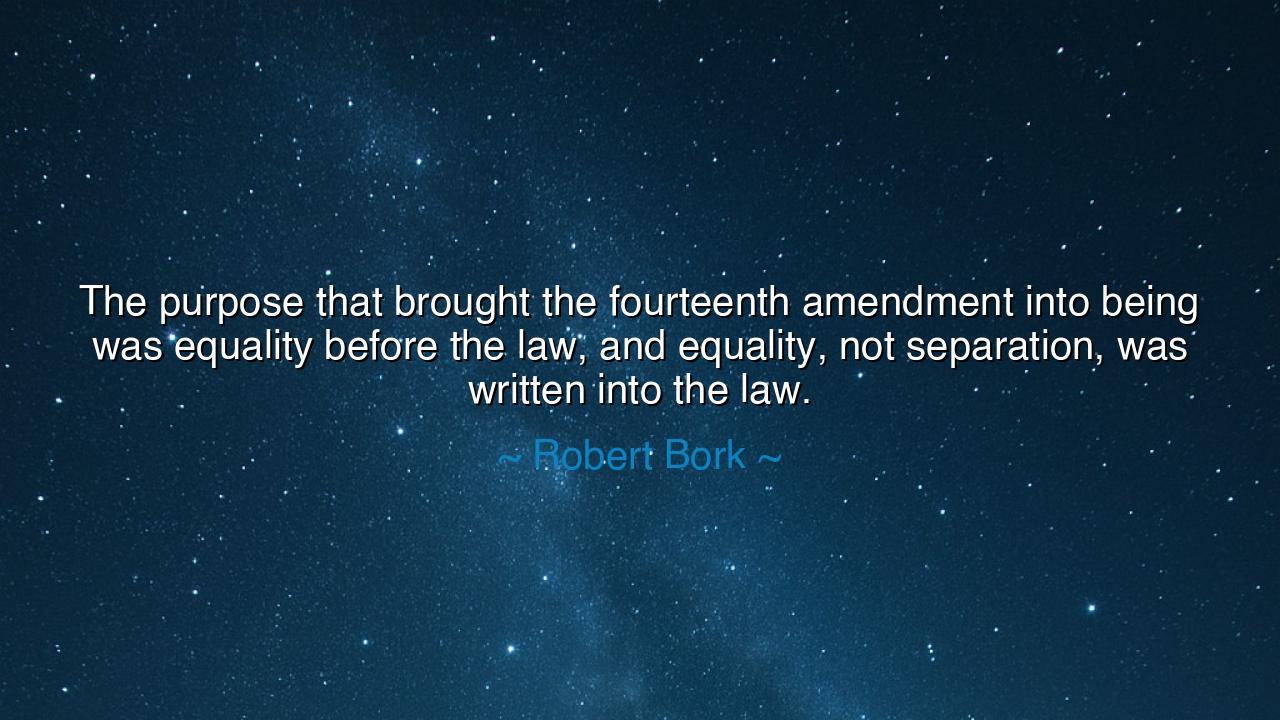
The purpose that brought the fourteenth amendment into being was
The purpose that brought the fourteenth amendment into being was equality before the law, and equality, not separation, was written into the law.






In the solemn and enduring words of Robert Bork, we find a declaration that echoes through the ages: “The purpose that brought the Fourteenth Amendment into being was equality before the law, and equality, not separation, was written into the law.” These are not the words of a mere jurist—they are the words of a man reaching into the moral core of a nation. For in this sentence lies the soul of justice, the very heartbeat of democracy. Bork reminds us that equality was not an accident of history, but a deliberate covenant—a promise written in the blood and hope of a people emerging from the long night of slavery. The Fourteenth Amendment, born from the ashes of the Civil War, was meant to sanctify a new beginning: a nation where no man would be above another, where law would be the great equalizer, not the instrument of division.
The origin of this quote lies in Bork’s reflections on the Constitution and its moral foundations. A conservative scholar and jurist, Robert Bork devoted his life to understanding the original intent of the Founders and the framers of the amendments that followed. When he spoke of the Fourteenth Amendment, he sought to remind the courts and the people alike that its meaning was not veiled in ambiguity—it was clear, luminous, and powerful. Drafted in 1866 and ratified in 1868, the amendment was written in the aftermath of a nation torn apart by civil war. It declared that all persons born or naturalized in the United States were citizens, and that no state could “deny to any person within its jurisdiction the equal protection of the laws.” In these words, Bork saw not permission for separation, but a command for unity—not justification for division, but a moral obligation to fairness.
The ancients, too, understood the sacred weight of equality under law. In the teachings of Solon, the great lawgiver of Athens, the foundation of democracy was the idea that justice must see all citizens with the same eyes—that the noble and the poor alike must kneel before the same standard. Bork’s words flow from this same ancient wisdom. For if the law favors one man over another, then it ceases to be law and becomes tyranny. The Fourteenth Amendment, in its conception, was the modern fulfillment of this ancient principle. It was a beacon, meant to guide a fractured people toward the light of shared humanity. Yet as Bork warns, when men twist the meaning of law to justify separation, when they build walls where bridges were intended, they betray not only the letter of the law but its spirit.
Consider the story of Brown v. Board of Education in 1954—a case that would test the meaning of equality itself. For decades after the Fourteenth Amendment was written, the doctrine of “separate but equal” had allowed segregation to thrive, reducing equality to a hollow word. In the segregated schools of the American South, Black children were denied not only the same resources but the same dignity as their white peers. Yet when the Supreme Court finally struck down segregation, it did so in the spirit of what Bork later articulated: that equality, not separation, is the law’s true purpose. The Court recognized that separation, by its very nature, is inequality. It is the declaration that some belong and others do not. Thus, Brown v. Board was not just a legal decision—it was a restoration of the promise that the Fourteenth Amendment had always carried.
Robert Bork understood that justice, like a flame, must be tended. It cannot burn bright if fed by hypocrisy or indifference. His words remind us that when lawmakers, judges, or citizens distort the meaning of equality, they dim that flame. To write separation into the law is to return to the shadows, to undo the progress earned through suffering and sacrifice. The Fourteenth Amendment was born not merely from legislation but from repentance—the repentance of a nation that had once enslaved its own. It stands as a covenant that must never be rewritten by prejudice or convenience.
And yet, Bork’s statement carries more than remembrance; it carries warning. Even in modern times, the temptation remains to divide rather than to unite, to protect one’s own comfort rather than uphold universal fairness. The pursuit of equality before the law is not a goal achieved once and forgotten—it is a continual duty. The moment society begins to accept subtle separations, to tolerate quiet injustices, the spirit of the Fourteenth Amendment begins to fade. Just as Rome decayed when it forgot its laws, so too will any democracy weaken when it forgets the sacred principle of equal protection.
The lesson, then, is clear and timeless: law must never become a tool of division. It must always be the instrument of unity and justice. Every citizen, every generation, must remember that equality is not a favor granted—it is a birthright protected. To honor the Fourteenth Amendment is to defend that truth daily: in courts, in schools, in homes, and in hearts. The just society does not ask, “Who deserves protection?” It proclaims, “All do.”
So let the words of Robert Bork stand as a torch for the generations to come: that the purpose of the law is to lift, not to divide; to bind wounds, not to reopen them. For when the law is pure, the nation is strong. And when the people hold fast to equality before the law, they preserve not only justice, but the very soul of civilization itself.






AAdministratorAdministrator
Welcome, honored guests. Please leave a comment, we will respond soon